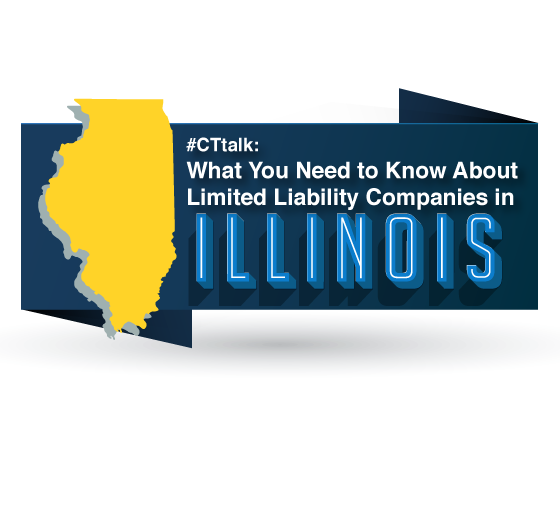By Ann E. Minarik
Assistant Vice President and Commercial Counsel
Chicago Title Insurance Company, Chicago NCS
DOWNLOAD ARTICLE HERE.
Introduction
Illinois was the 18th state in the Union to adopt a version of the limited liability company concept. The original Illinois Limited Liability Company Act (“ILLCA”) [1] took effect as of January 1, 1994. Since 1994, all 50 states have enacted similar legislation. The ILLCA is by no means a carbon copy of any other state’s version, and revisions to ILLCA, effective January 1, 1998, affect all Illinois limited liability companies (“LLC”) as of January 1, 2000. The most noteworthy revisions regard (1) permitting almost perpetual life for LLCs, (2) authorizing single-member LLCs and (3) permitting the conversion and merger of LLCs and other entities.
Illinois real estate practitioners have embraced the LLC concept, and the popularity of LLCs has grown steadily every year since 1994. A high percentage of commercial real estate transactions in which the parties would customarily have conveyed the land into land trusts, corporations or partnerships are increasingly using existing or newly-created LLCs. From a title company’s perspective, it is common to see single-purpose LLCs formed. An example of this is an LLC with a name bearing a property address, with the sole purpose of this LLC to acquire and manage this particular real estate. Members and managers of this single-purpose LLC may be members and managers of other similar single-purpose LLCs.
What is an LLC and what makes it so popular? How does it differ from corporations and partnerships, since it appears to be a blend of both? An LLC is an unincorporated entity and offers its members (with some exceptions) protection from personal liability for a debt, obligation, or liability of the LLC solely by being or acting as a member or manager.[2] Another attractive feature is favorable tax treatment. Although an LLC may elect to be taxed as a corporation, most LLCs are “pass through” entities. Typically, a multiple member LLC is treated for tax purposes, like a partnership with members paying federal taxes, and no federal tax owed by the LLC.[3] A single member LLC can be treated, for tax purposes, as a “disregarded entity,” with all tax ramifications reported by the sole member. LLCs offer flexibility in operation in that they may be managed by members, designated managers, or a combination of both.
When a new LLC is created, a document called Articles of Organization must be executed and filed with the Illinois Secretary of State’s office along with the appropriate filing fee. The Secretary of State’s form LLC-5.5 must be used. Articles of Organization contain information about the name, principal place of business, purpose of the LLC and the name of the registered agent. The LLC must contain one of the following designations in its name: (1) LLC (2) L.L.C. or (3) Limited Liability Company. [1] The LLC name cannot contain any word or abbreviation that confuses the LLC with any other type of entity such as (1) Corporation (2) Corp. (3) Incorporated (4) Inc. (5) Ltd (6) Co. (7) Limited Partnership or (8) L.P. The person who executes and delivers the Articles of Organization is called the organizer. (9) Company, except as part of the phrase “Limited Liability Company.” As with corporations, the name of the LLC cannot be a duplicate of an existing LLC filed in Illinois. If the LLC anticipates extensive out-of-state contacts, whether through expected real estate ownership or as an ongoing business, it is prudent to search the Secretary of State’s records in these other states to make sure the same name is not already in use. A box must be checked on the second page of the Articles of Organization form as to whether LLC management is vested in the member(s) or in designated manager(s). The ILLCA does not require management by members. As a result, members can manage the LLC, or they can appoint outsiders to manage the LLC. ILLCA allows the filing of Articles of Amendment to the Articles of Organization at a later time as needed.
The LLC must file an annual report form with the Illinois Secretary of State and pay a fee. Failure to file the report and maintain a registered agent in Illinois is grounds for the the administrative dissolution of the LLC by the Secretary of State.[2]
Members may memorialize their business relationship by executing a document called an operating agreement. The ILLCA does not require an operating agreement, so it may or may not be in existence at the time of LLC organization or ever. It is a document drafted exclusively for the LLC and is similar to partnership agreements or corporate by-laws. If one exists for the LLC, the operating agreement does not need to be filed with the Secretary of State. Creative drafting of the operating agreement provides much flexibility for the LLC. The ILLCA has many default rules to govern LLCs in the absence of an operating agreement.
Single-member LLCs are allowed under the 1998 ILLCA revisions [3]. This means that an individual or single entity can create and operate an LLC without other members.
Since January 1, 2010, the statute created an entity known as Low-Profit Limited Liability Company, and the name must contain the term “L3C”. See 805 ILCS 180/1-26
This is an important change for smaller businesses that do not have multiple owners. Single-member LLCs can be manager-managed as well as member-managed. Before the ILLCA revisions, the individual or entity usually formed a corporation since a partnership structure was not an available option. Now, the individual or entity may utilize the LLC concept.
An important question for the party forming the LLC is whether it shall be manager or member-managed. What are the differences?
Member-managed. Unless set forth otherwise in the operating agreement, members have equal rights in the LLC management structure.[1] Majority rules, and there is one vote per member unless provided otherwise in the operating agreement. Full consent of the members is always necessary even if the operating agreement provides otherwise before certain actions can occur such as admission of a new member, an amendment to the Articles of Organization, merger with another entity or the conveyance of substantially all of the property owned by the LLC.[2]
Manager-managed. Managers have authority to conduct business on behalf of the LLC. All managers have equal management rights unless provided otherwise by the members in the operating agreement. Managers can be, but are often not, members of the LLC. Manager-managed LLCs are similar in structure to a corporation. This makes it an easy adjustment for third parties who are accustomed to transacting business with a corporate officer. This management style also resembles the role of the general partner in partnerships. Third parties not accustomed to transacting business with an LLC may still require review of the operating agreement to determine who has actual authority to transact business on behalf of the LLC.
Merger of entities
LLC mergers with or into other entities such as general or limited partnerships, corporations or other LLCs is now allowed under the 1998 amendments to the ILLCA[3]. A merger terminates the separate existence of the entities that comprise the new entity but not the debts and obligations. All property owned by the respective entities automatically vests in the surviving entity. Each entity that is a party to the merger must execute a form called an Articles of Merger. If the new entity buys, sells or encumbers property, title companies require a copy of the Articles of Merger. The merger is not complete until the parties file the Articles of Merger document with the Illinois Secretary of State. This document must contain the name and address of the new entity and all entities that are parties to the merger. If one of the merging parties is a corporation, a plan of merger must be attached to the Articles of Merger. The plan of merger must be approved according to the controlling authority documents or statutes governing each entity. For example, foreign corporations or entities must comply with the laws of their home states.
LLC mergers with or into other entities such as general or limited partneships, corporations or other LLCs is now allowed under the 1998 amendments to the ILLCA[1]. A merger terminates the separate existence of the entities that comprise the new entity but not the debts and obligations. All property owned by the respective entities automatically vests in the surviving entity. Each entity that is a party to the merger must execute a form called an Articles of Merger. If the new entity buys, sells or encumbers property, title companies require a copy of the Articles of Merger. The merger is not complete until the parties file the Articles of Merger document with the Illinois Secretary of State. This document must contain the name and address of the new entity and all entities that are parties to the merger. If one of the merging parties is a corporation, a plan of merger must be attached to the Articles of Merger. The plan of merger must be approved according to the controlling authority documents or statutes governing each entity. For example, foreign corporations or entities must comply with the laws of their home states.
If a member-managed LLC with or without an operating agreement merges with a limited partnership, all the LLC members must consent to the merger.[1]
Conversion to LLC
The 1998 amendments to the ILLCA[2] allow conversions of partnerships or limited partnerships to an LLC. All partners must consent to the conversion unless the partnership agreement provides otherwise. An agreement of conversion document sets forth the interests of the partners as members in the LLC and whether any cash is due to any partner upon conversion to the LLC. Articles of Organization must be filed with the Illinois Secretary of State containing information about the converted partnership including the former partnership name and whether the appropriate number of partners voted in favor of the conversion. The actual conversion occurs when the parties file the Articles of Organization with the Illinois Secretary of State or, if specified in the Articles, no later than 30 days after filing. After conversion, all property owned by the converting partnership automatically vests in the LLC. If the newly-converted LLC buys, sells or encumbers real estate, title companies require a copy of the filed Articles of Organization in addition to the other items discussed at the end of this article. Debts and obligations against the partnership become obligations of the LLC. All partners of the partnership are members of the LLC unless changed in the agreement of conversion.
Dissolution and Dissociation
As stated earlier in this article, the Illinois Secretary of State may dissolve an LLC for failure to file its annual report and nonpayment of the annual fee. This is an example of an administrative LLC dissolution. Can members dissolve an LLC as well? What if there comes a time when one or all of the members want to dissolve the LLC? Perhaps the LLC successfully completed its main business purpose and there is no other reason for the LLC to continue. For example, a real estate title-holding LLC sells its single asset. Perhaps only one member wants to resign and the others want the LLC to continue. In the absence of other provisions in the operating agreement, the remaining members must purchase the outgoing member’s interest for fair market value, assuming such dissociation does not cause a dissolution. Fair market value may, however, be difficult to ascertain to the satisfaction of all the members. [3] A member can transfer its distributional interests to third parties but the transferee does not become nor enjoy any membership rights.[4]
The ILLCA does not allow the operating agreement to preclude the resignation of a member. In some circumstances, however, this dissociation may be detrimental in some way to the continued successful operation of the LLC as a whole. For example, a high-
profile member who is primarily responsible for the profitable operation of the LLC resigns, or a member’s dissociation is a breach of an express provision in the operating agreement.[1] When this is the case, a reduction in the outgoing member’s distributional interest is allowed. Death also terminates a member’s interest and triggers a distribution to the estate of that member, but the death of that member does not automatically dissolve the LLC. Prior to the 1998 ILLCA revisions, death of one of the members automatically dissolved the LLC.
If the LLC is dissolved by its members, whether by provisions set forth in the operating agreement or otherwise, a form called Articles of Dissolution must be filed with the Illinois Secretary of State. It should not be filed with the Secretary of State’s office until the “winding up” [2] period is over. Creditors’ claims have priority over those of members. There are strict notice requirements to creditors[3] that must be followed to prevent potential personal liability for managers and members. Proper publication in a newspaper of general circulation will cut off any claims brought more than 5 years after the publication date.
Public Act 98-776 (SB 1098) took effect on January 1, 2015 which amends various business entity statutes to, in effect, counteract the Illinois Supreme Court’s decision in Pielet v. Pielet, 2012 IL 112064 (dissolved corporation may only be sued, within a 5 year limitation period, if the cause of action accrued before dissolution).
As amended, Section 12.80 of the Business Corporation Act of 1983 now reads in part as follows:
“The dissolution of a corporation….shall not take away nor impair any civil remedy available to or against such corporation, its directors, or shareholders for any right or claim existing or any liability accrued or incurred, either prior to, at the time of, or after such dissolution if action or other proceeding thereon is commenced within five years after the date of dissolution.” (Emphasis added.)[4]
Perhaps the amended statute might also be applicable to limited liability companies, but there is no such amendment to date in ILLCA.
Title Insurance Requirements
A title company raises certain title exceptions on the title commitment whenever an LLC is selling, buying or encumbering LLC property. Title companies require a copy of the LLC’s Articles of Organization, proof that the annual filing fee is paid and a copy of the operating agreement, if an operating agreement exists. If the LLC is member-managed, the title examiner reviews the section in the operating agreement that discloses which member or members can execute the necessary documents on behalf of the LLC. If the LLC is manager-managed, the examiner reviews the authority language regarding a specific manager or multiple managers. Since LLCs are drafted with so much flexibility, title companies may also wish to review a copy of the fully executed resolution by all the members authorizing the contemplated transaction. This request from the title company is common when there is no operating agreement to review and all members consent to have perhaps only one member execute all the documents required to consummate the real estate transaction. LLC members and managers are often artificial entities such as other LLCs, partnerships or corporations. When that is the case, title companies require the authority documents for all the additional entities. This assures the title company that the parties who sign the real estate documents can legally bind the LLC.
Conclusion
Illinois real estate practitioners recognize and utilize the many advantages LLCs provide for clients. A single entity or individual can take advantage of the LLC structure. Unlike land trusts, LLCs exist in all 50 states. The same investors can create many single-purpose LLCs and they (members) or designated outsiders can handle the day-to-day operations of the LLC. Favorable flow-through tax treatment and drafting flexibility offer partnership-like characteristics along with corporate-style limited personal liability. There is little caselaw at this time. Only time will tell what type of caselaw develops in the years to come.


